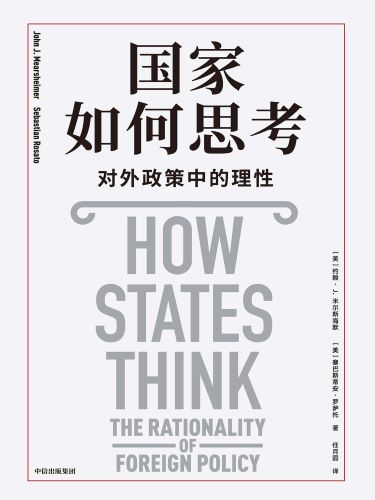国家如何思考:对外政策中的理性-电子书PDF/EPUB/MOBI/TXT
国家如何思考:对外政策中的理性-电子书PDF/EPUB/MOBI/TXT

国家如何思考:对外政策中的理性.jpg
作者: [美] 约翰·J.米尔斯海默 / [美] 塞巴斯蒂安·罗萨托
出版社: 中信出版集团
副标题: 对外政策中的理性
原作名: How States Think: The Rationality of Foreign Policy
译者: 任月园
出版年: 2024-11
第一章
理性行为者假设
参见(举例)Ewen MacAskill, “Irrational, Illogical, Unpredictable-24 Years On, the World Awaits Saddam's Next Move,” Guardian, 18 March 2003; Victor Davis Hanson,“The Not-So-Mad Mind of Mahmoud Ahmadinejad,” Chicago Tribune, 20 January 2006;Phil Gunson, “Is Hugo Chavez Insane?” Newsweek, 11 November 2001; Kate Kelland,“No Method in Deciphering Gaddafi 's Mind,” Reuters, 3 March 2011; Mark Bowden,“Understanding Kim Jong Un, the World's Most Enigmatic and Unpredictable Dictator,”Vanity Fair, 12 February 2015。
对于美国领导人来说,将外国对手描述为“非理性的”已司空见惯。在过去25年间的某些时点上,萨达姆·侯赛因、马哈茂德·艾哈迈迪-内贾德、乌戈·查韦斯、穆阿迈尔·卡扎菲、金正恩和弗拉基米尔·普京以及其他一众人等皆被贴上了“不理性”、“不合逻辑”、“疯狂”、“妄想”或“疯了”的标签,在某些情况下,他们被拿来跟阿道夫·希特勒相提并论,而后者经常被描绘为非理性的典型人物。
Emilie M. Hafner-Burton, Stephan Haggard, David A. Lake, and David G. Victor, “The Behavioral Revolution and International Relations,” International Organization 71, no. S1 (2017): 2.
在学术界,将包括政策制定者在内的个人视作非理性的观点可能更具影响力——据说,“在过去几十年间,一场新的行为革命席卷了社会科学领域” 。许多政治学和经济学的学子们在心理学家研究成果的基础上坚持认为,人类的行为方式经常违背理性的要求,从普通消费者到国家元首莫不如此。
关于这一点,参见Uriel Abulof, “The Malpractice of ‘Rationality’ in International Relations,” Rationality and Society 27, no. 3 (2015): 359; Kevin Narizny, “On Systemic Paradigms and Domestic Politics: A Critique of the Newest Realism,” International Security 42, no. 2 (2017): 160-161; Alexander Wendt, “Anarchy Is What States Make of It: The Social Construction of Power Politics,” International Organization 45, no. 2(1992): 391-395. For the claim that the rationality assumption is central to both liberal and realist approaches, see Robert O. Keohane and Joseph S. Nye, Jr., “Power and Interdependence Revisited,” International Organization 41, no. 4 (1987): 728. For the claim that it is central to liberal approaches, see Andrew Moravcsik, “Taking Preferences Seriously: A Liberal Theory of International Politics,” International Organization 51,no. 4 (1997): 516-521. And for the claim that it is central to realist approaches, see Robert O. Keohane, “Theory of World Politics: Structural Realism and Beyond,” in Neorealism and Its Critics, ed. Robert O. Keohane (New York: Columbia University Press, 1986), 164-165; Jeffrey W. Legro and Andrew Moravcsik, “Is Anybody Still a Realist?” International Security 24, no. 2 (1999): 6, 12; Brian C. Schmidt and Colin Wight, “Rationalism and the ‘Rational Actor Assumption’ in Realist International Relations Theory,” Journal of International Political Theory (forthcoming)。
关于人们无法在不放弃研究项目本身的情况下放弃或修改其假设的观点,参见Imre Lakatos, The Methodology of Scientific Research Programmes: Philosophical Papers, ed. John Worrall and Gregory Currie (New York: Cambridge University Press, 1978), 1:1-101。
如果这些说法属实,那么传统的国际关系学学术研究就遭遇麻烦了,因为它在很大程度上建立在国家是理性行为者的假设之上。 发现国家经常是非理性的,这将破坏掉该研究领域的许多核心论点和见解,并促使人们对整个研究事业产生怀疑。 这也将使国家领导人不可能制定有效的对外政策。毕竟,他们将无法预测其他国家会如何采取行动。总而言之,学术界和现实世界之间是如此休戚相关。
国家如何思考:对外政策中的理性-电子书PDF/EPUB/MOBI/TXT
